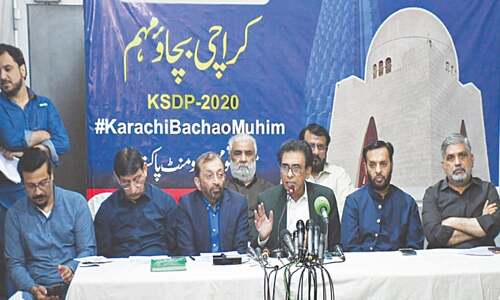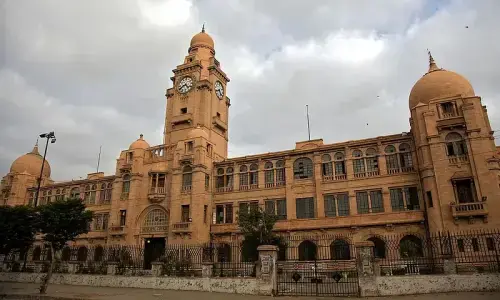KARACHI: There are actors who define a decade. Back in the 1970s it was Neelofar Abbasi, née Aleem, who did so with her standout performance in the TV drama serial Shehzori. She acted in many other plays and created a life beyond acting but it is this career-defining performance in Shehzori, adapted from a novel of Azeem Baig Chughtai, which catapulted her to stardom and lifelong fame. Every literary personality worth their salt specified this on Saturday at the Anjuman Taraqqi-i-Urdu office where they had come together to meet Neelofar Abbasi and speak about her.
First up was well-known critic, writer and educationist Asif Farrukhi. He recalled her famous dialogue in Shehzori: “Main bahut buri aadmi houn” (I am a bad person), but he found her otherwise. Coming back to Shehzori and the relevance of the play at the time, he said: “It was for the first time that a bold and assertive girl was shown on TV. It was perhaps difficult to do so at that time but now it is even more challenging to do so because according to some TV scriptwriters the marketers want to know how many times a female character has been slapped in the play they have written for the channel. Shehzori is needed now more than ever.” Ms Abbasi was known as the Shehzori girl and was a role model, he added.
He also paid homage to Azeem Baig Chughtai saying the elder brother of Ismat Chughtai had never been given his due credit. “He is known for his light-hearted stories but he was also a serious writer. Haseena Moin adapted his story for TV in the form of Shehzori, which went on to become a huge success.”
He also revealed to the well-attended gathering that he and Ms Abbasi were cousins. “All my life I have known her as Neelo baji because she happens to be my first cousin. She is a good conversationalist and she has inherited this trait from her mother. Her father, Aleemuddin Khan, used to write columns for a newspaper. And her uncle (mamoon) Anwar Ahsan Siddiqi was a political worker and writer who penned his memoirs which merits reading.”
Mr Farrukhi also highlighted her other achievements such as her master’s degree in microbiology, her association with the Pakistan National Centre as its director in Karachi and the penning of her memoirs, Kahi Ankahi.
Another well-known writer Dr Fahmida Hussain, also a former director of Shah Abdul Latif Chair at Karachi University, spoke highly of Ms Abbasi and her family. She had met the actor in college and got a chance to meet her parents and was particularly charmed by Ms Abbasi’s father. “He would often recount anecdotes of his village in India and I found similarities of his village life with Sindh’s village lives.” She recalled other personal anecdotes including their Urdu classes in D.J. Science College, a drowning incident off the Sandspit beach and their rescue by a fisherman and Ms Abbasi’s constant need for borrowing her clothes.
Nusrat Bhutto and Shehzori
For Zulqernain Jamil, aka Raju Jamil, Ms Abbasi was not only a co-actor but also a sister. He remembered her wedding when Nusrat Bhutto, wife of former prime minister Zulfikar Ali Bhutto, spoke to him wanting to know what was a good time to appear at Ms Abbasi’s wedding function. “Ms Bhutto was extremely fond of Neelofar because of Shehzori,” said the president of the Anjuman Taraqqi-i-Urdu.
Ms Abbasi profusely expressed her gratitude to the speakers and to all the guests. Referring to her need for borrowing clothes from her college mate, Ms Abbasi said: “I was a student at the time when I started to work in TV plays and every scene required new clothes. PTV at the time did not have the budget for wardrobe. Hence, I had no choice but to borrow clothes from Fahmida who had a great sartorial taste and had an extensive wardrobe.”
About Nusrat Bhutto’s appearance at her wedding, she said: “It was Fahmida’s idea to invite her. I thought there was no way she was going to turn up. But she did and gave me a present and invited me and my husband for dinner at the PM House.”
About the writing of Kahi Unkahi, she said it was all because of her late husband Qamar Ali Abbasi, well-known travel writer, who insisted that she write.
Prof Sahar Ansari also spoke about his association with Ms Abbasi and particularly her uncle Anwar Hasan Siddiqi. About Shehzori he said the character even influenced Pakistani films recalling Shabnam’s character in the film Anmol.
Earlier, while moderating the proceedings Dr Fatema Hasan said that it centered on International Women’s Day and paid tribute to women writers and especially mentioned poet Ada Jafri whose death anniversary fell on Saturday.
Published in Dawn, March 13th, 2016


































